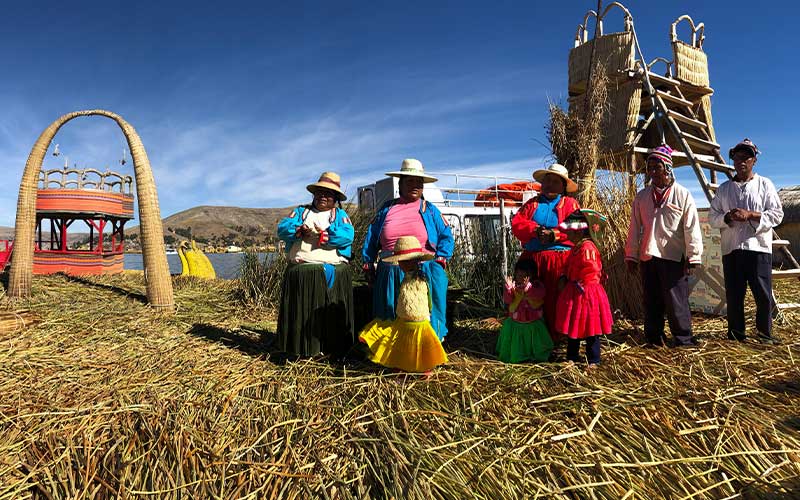Studying abroad can broaden your perspective of education, bring in new opportunities for success, and connect you with like-minded individuals you might otherwise never get the chance to meet. No matter your major, Maximo Nivel can create a custom program that makes sense for your academic and career goals.
Rounding off our series of memorable study abroad moments are those who chose to study in Peru. Here’s what they had to say about their experiences at our campus in Cusco, Peru.
Samuel B. – Foreign Languages Study Abroad
For 5 years, the number one destination on my bucket list was Machu Picchu. I’m happy to say that I was finally able to scratch it off my list – and get it stamped in my passport – while studying abroad. I’m borderline obsessed with Latin American history ever since learning about the “conquistadores” during a world history class in high school. I was already taking Spanish classes then, but that chapter encouraged me to major in Spanish and History in college.
My study abroad program in Peru included two upper-level Spanish courses that granted me 3 credits each on my transcript. And I never even expected to be granted credit for my trip to Peru, but it was actually added to my transcript as a history elective. Touring the ancient citadel was hands-down the most memorable moment during the time abroad. Being able to walk the paths constructed and traversed by the Incas and witnessing the massive creation of the largest ruling empire in South America was a dream come true.
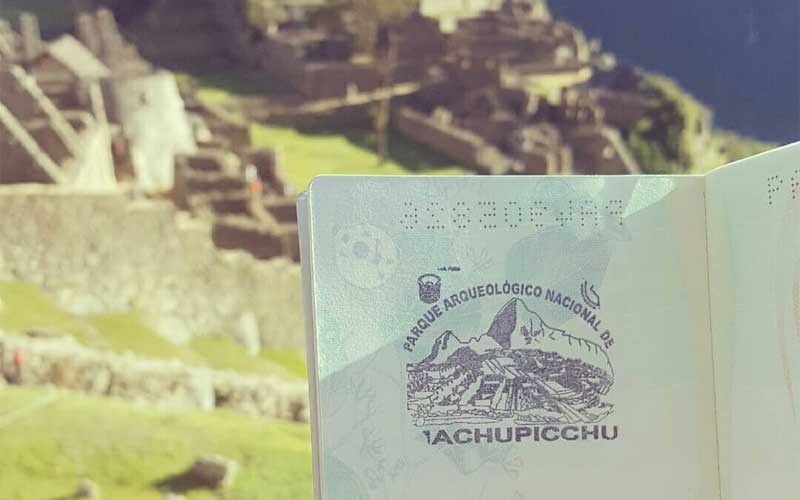
Charles T. – Amazon Conservation & Reforestation
I’m an active member of the Environmental Club at my University. Everyone part of this group understands that climate change is one of the biggest threats to our planet, and places this issue above all. That’s why a group of us decided to join a service-learning project in the Amazon Jungle.
What most attracted us to the Jungle Conservation program is its focus on reforestation. Although the Amazon Jungle plays the most important role in regulating our planet’s oxygen and carbon cycles, it hasn’t been fully protected from deforestation. In my eyes, immediate reforestation is essential. And the lack of it is one of the reasons for the destructive forest fires that took place during the last dry season.
Our group worked long and hard to plant hundreds of trees during our time in the jungle. Our group rotated responsibilities so that some were maintaining trails and pulling invasive species to ensure the success of our newly planted trees. I know we weren’t able to actually see the difference when we left, but we left knowing we made a difference that will prove fruitful. That’s why we plan to return during spring break to continue the work we started, and witness the change we were apart of.
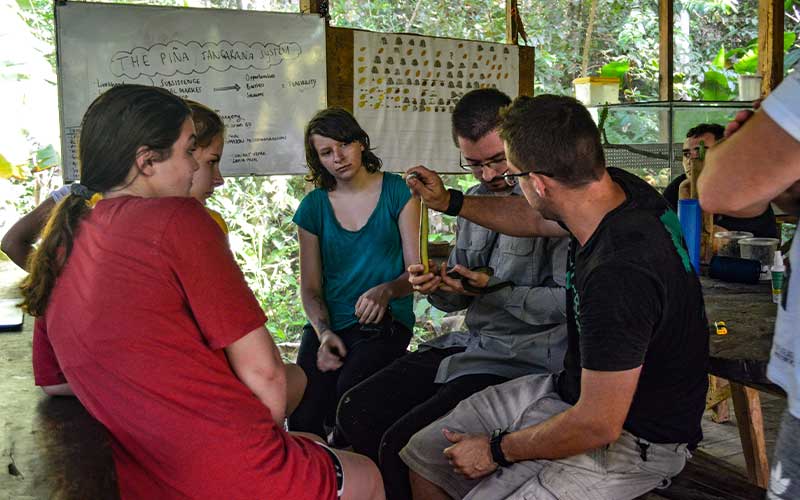
Danielle L. – Anthropology Study Abroad
I’m one of those “late Millenials”. I’m in that awkward mid-stage that remembers a time before the internet and cell phones, and yet can seamlessly navigate between apps like a pro. As technology quickly evolved, I noticed how culture changed with it. It quickly became a clutch for those looking to avoid social situations like having difficult in-person conversations or awkward small talk. I chose to major in anthropology because I was interested in studying how different cultures interacted with one another.
I joined the Anthropology Study Abroad program at Maximo Nivel’s Peru because it allowed me to complete field-study for credit. I spent 7 weeks volunteering with an Andean family in the Andes mountains outside of Cusco. They lived without many of the modern comforts, and yet they were happier than those who I interviewed back home.
A typical day consisted of tending to the farm animals, cooking breakfast, assisting with household chores, caring for the children, assisting with lunch for the village, weaving, and dinner. After my responsibilities were settled, I visited neighbors and interviewed them for my thesis. Almost all of the interviewees said they didn’t need anything else to be happy; complaints were minimal and typically settled on trivial matters in their personal relationships. It seemed that the less one had, the less one had to complain about.
I’m so grateful I made the decision to participate in this experience. Not only did it help me with my research, but it helped me to realize how fortunate I am. If they could be happy living so simply, why couldn’t I do the same? I realized I could. And I’m excited to continue traveling and learning even more lessons.
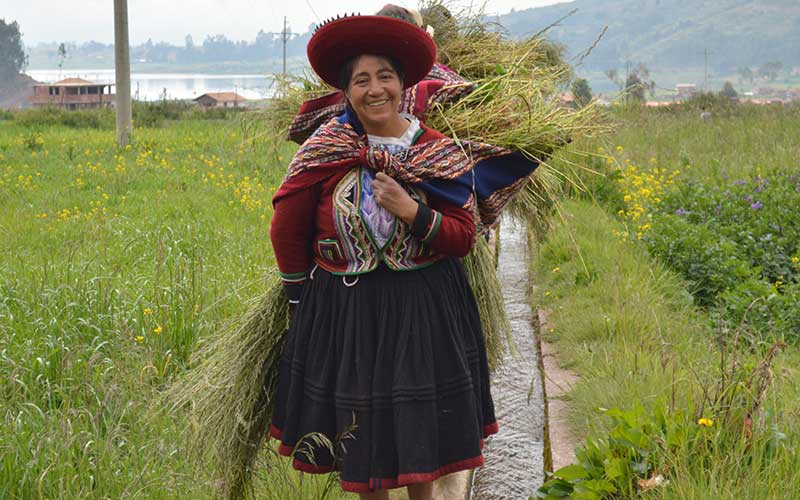
Josiah F. – Hospitality & Tourism Internship
I kind of chose Hospitality Management blindly. What I did know was that I loved the hotel experience when I traveled. I learned during my hospitality & tourism internship that it’s actually the perfect fit for me. My co-workers actually complimented my work ethic – a big smile, enthusiastic greetings, and customer service. However, this all came very naturally to me. I’m super outgoing, a people-person, and I just want to make sure every guest has an amazing experience. I took what I really liked about the people who worked at hotels I stayed at and I emulated that.
My most memorable moment while working at a small hotel in Cusco was when I met a couple from Chile. They had been traveling South America, and Cusco was their last stop before flying home. It was my most memorable moment because they presented an incredible opportunity I would have never gotten a chance to take had I decided to stay at school.
They really liked my personality, and they offered a work-stay opportunity at a hotel they happened to own in Chile. They were very clear about the terms of the agreement – free stay and three meals per day in exchange for 5 hours a day/ 5 days a week. Still, I saw the benefits. It was the perfect chance to continue gaining experience in the hotel industry while experiencing life abroad.
I went back home after my internship, completed my last semester, and took them up on their offer. I’ve now been in living in the small port city of Zapallar for 3 months, and I’m not sure when I’ll be returning.
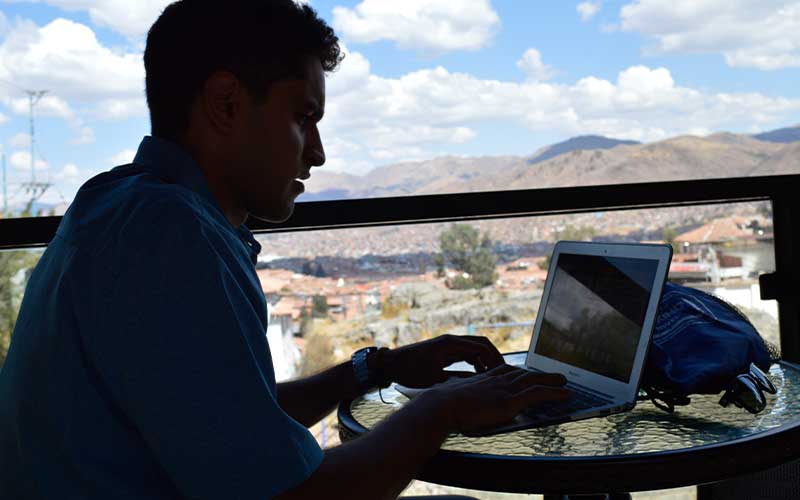
Sasha R. – Eco-Agriculture
I was provoked to join an Eco-Agriculture volunteer program in Peru by accident. I love coffee. I make it everyday, but I usually leave a bit in the pot before rushing off to class. One night, when I made it back to my room, my roommate immediately pulled me onto the couch to watch a documentary with her. I wasn’t prepared to learn about the lives of coffee farmers. They woke up before the sun came up and worked until the sun went down. Day in and day out, never a day off. Every farmer interviewed wished for more hands on the field, but couldn’t afford it. It made me regret wasting all the coffee that I had, and I wanted to do something to give back.
I’d always considered myself a pretty socially conscious person, but no, I’d never thought about coffee farmers – ever. I was so grateful to have it any time of day with no trouble getting it, but I never considered where it came from or how. So, although I was embarrassed, I was inspired.
The work on the coffee farm was hard. We woke up around 6:00 AM for breakfast and then hiked about 20 minutes to the farm. We’re provided baskets for picking cherries; we learned that red cherries were the best, while the green ones needed more time to ripen; yellow and black cherries were unusable. We sorted through them and only picked the best ones for processing. We pick for about 4 hours, with short breaks in between, and then finally we have lunch and are free for the afternoon.
My most memorable moments were the afternoon coffee we all shared around the kitchen table. Knowing how hard the farmers and their workers worked and having experienced it myself, made me feel much more gratitude for the cup in my hand, and all the previous cups I’d indulged in before knowing anything about the process. Although the documentary first made me uncomfortable, I’m glad it did because I would have never experienced a spring break quite like the one I did while volunteering at a coffee farm in Peru.
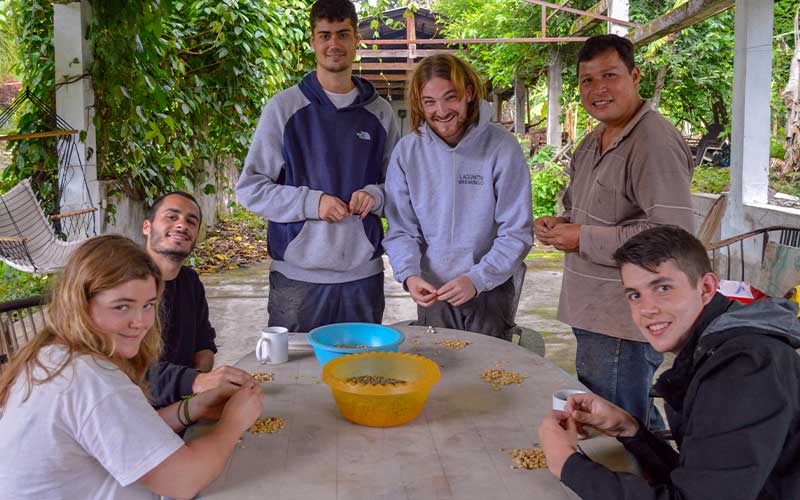
Cassandra H. – Foreign Languages Study Abroad
I actually had no intention of spending a semester abroad. I was comfortable living on campus and stressing over academics, but my parents were the ones who carried the burden of my misery. They watched me add advanced courses to my schedule and then stress over scores and extracurricular activities. So, they made an ultimatum: either I would take a semester outside of the “miserable environment” or they weren’t going to pay for my next semester. I actually almost paid for it myself, but I knew working and going to school would affect my 4.0 GPA. So, I went abroad.
While in Peru, I learned that sometimes your parents are actually right. I still worked hard at my classes, but being away from campus, in another country, made me feel a sense of freedom. I took a four of Spanish courses to satisfy my foreign language requirement, a sustainability course that satisfied my environmental science requirement.
My most memorable moment abroad was playing bingo during a Spanish course. The assignment was to come up with 16 questions using the “presente perfecto”. Then we ran around the room trying to find other students who answered affirmatively to our questions. We had to get 4 affirmative answers in a row from different students to win bingo. I’ve never had so much fun in my life! Everyone was eager to ask questions which allowed us to not only practice the grammar, but also our pronunciation and conversation skills. I actually ended up winning the first round, and I just remember saying “wow, I can’t believe I’m learning something and not stressed right now” as I munched on a Peruvian candy bar with tears in my eyes from laughter.
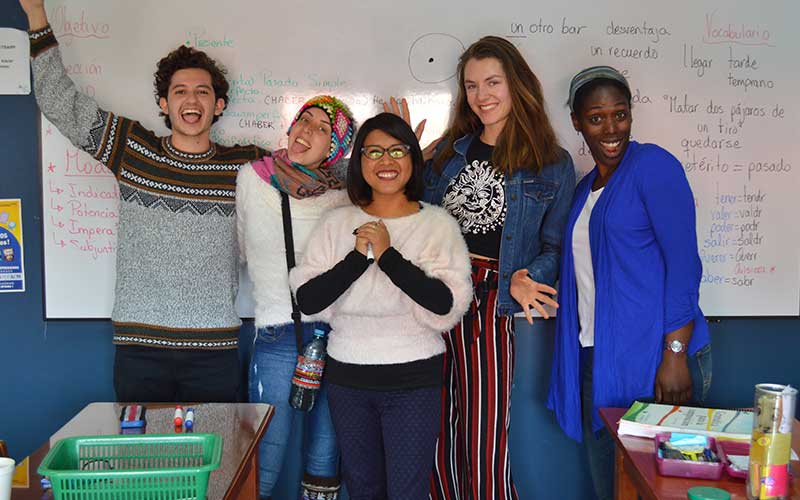
Gissell R. – Medical Internship
I had a classmate who completed a summer program with Maximo Nivel, so when she came back to school in the fall she gave me all the details. She told me she lived with a host family with a few other medical students and worked at a local clinic. I was impressed by how positive she was about her experience, and so I decided I would intern the following summer, after graduation. Since she had already been in Guatemala, we decided to enroll in a medical internship in Peru together.
My experience was nothing short of amazing. Our host family was so sweet and made sure we were comfortable the whole time. The family consisted of our host mom and dad, an older daughter and her own baby who lived in the house. I and my friend Julissa shared a room, and we were fortunate enough to share the house with two licensed nurses who were volunteering at the clinic nearby.
We commuted to the local clinic by bus and were assigned to triage. We asked questions and noted information on patient charts, assessed any medical complaints and wounds, and assisted the doctors. My most memorable moment was when the doctor invited me to assist with stitching the wound of a young kid who’d fallen off of his bike. He’d started the sutures as I watched intently how he sewed the two sides of the skin together. He expertly tied the knot at the end so that the wound stays closed and heals correctly. Then he looked at me and said: “now give him instructions on how to care for his wound”.
I gulped hard, not expecting him to put me on the spot. Not only was he testing me to determine if I’d been giving the proper instructions to patients when they left, but he would also be evaluating my Spanish. Slowly and clearly, I explained to the young boy how important it was to be very careful and gentle because he didn’t want to reopen his wound. I explained that he should wait 24 hours before cleaning it and that he should make sure to keep his wound clean by using soap and water at least twice per day and to pat dry gently. He couldn’t risk infection. Finally, I warned him against swimming and told him to make an appointment with the front desk to return in 4 weeks. “Algo mas, Doctor?” I asked. “No. Todo perfecto” he responded with a smile, shook my hand, and lead the boy out. I was thrilled.
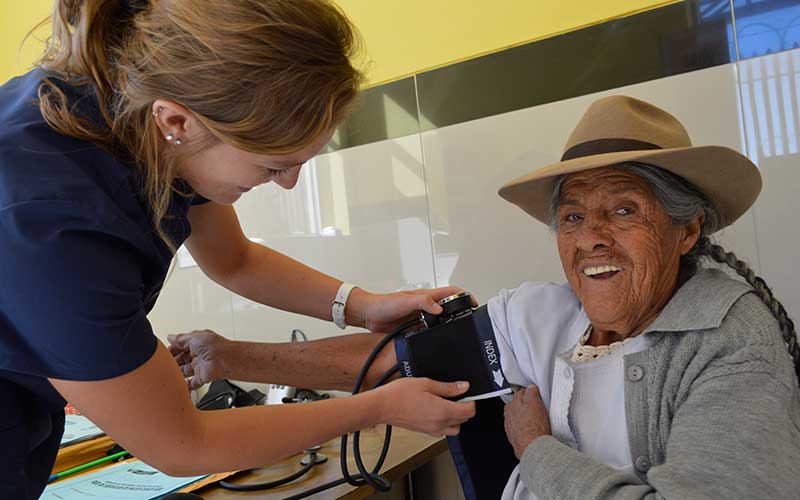
Wilmer O. – Business Study Abroad
I come from a long line of entrepreneurs so I was set on studying business long ago. My mom used to be a teacher, and my dad also worked in education. They decided to open their own education consulting company, while two of my uncles were in car sales, and an aunt had her own restaurant. Although I have great mentors within my own family, I thought it would be a good idea to study business abroad and determine how others conducted their businesses.
I took Marketing and Entrepreneurship in Latin America in addition to Spanish courses for credit. I also enrolled in a micro-business internship where I assisted with marketing for a travel company. In my role, I was able to apply a lot of the strategies I’d learned from my courses and even started a social media ad campaign to expand the business to more potential customers. I’m not sure of the exact conversion rates, but I do know that inquiries and direct messages had boosted since the ads started running.
However, the most memorable moment happened during my first “employee appreciation” event. The owner hosted lunch for his employees every Friday and they sat around enjoying a meal together and playing games. This is something that none of my family members had implemented. They were busy balancing their books and ensuring profits were higher than the previous month. There was no budget for an employee appreciation month. But I noticed this made the employees really feel valued and committed to their company. Was this something I could pitch back home?
I went back home and told my parents about my experience. I was eager to share the employee appreciation idea but they were a bit hesitant about it. So, I did some research. I learned that employee appreciation resulted in a 24% improvement in quality, a 10% reduction in employee turnover, and a 27% percent reduction in missed work. I also found that 90% of employees who felt appreciated trusted their employers and complied more thoroughly with requests. I was even able to pitch the idea that we could use employee appreciation as a recruitment tool to attract better candidates. Maybe I’ll go into sales because my research and presentation finally convinced them to implement a similar structure and it’s been a more pleasant environment for everyone involved.
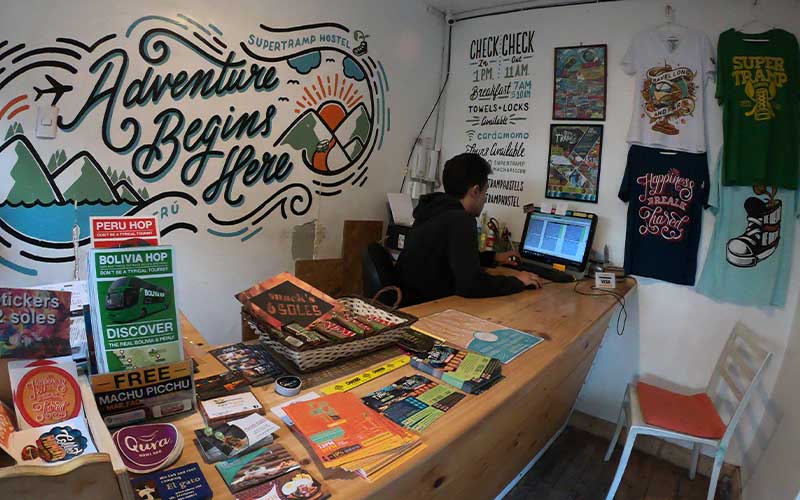
Kai C. – Country Jumper Gap Year
I was in my fourth semester at university, but I was already feeling burnt out. I honestly wasn’t sure in which direction to go, I just knew I wanted to go. I convinced my parents to allow me to take a gap year. I needed time to sort some things out before deciding on a major and continuing my education. I’d already put in two years, and the halfway point seemed like a good compromise for us.
So, instead of embarking on a third year in school, I took a gap year that would allow me to visit Costa Rica, Guatemala, and Peru. Maximo Nivel helped me to create an itinerary that wouldn’t just allow me to aimlessly roam Latin America. Although I was going to have some freedom and fun getting to know these new places, I would also have a plan in place that maintained structure and allowed me to receive an education in alternative ways.
At the end of my time, I ended up with 12 Spanish credits and two certifications; TEFL and Scuba. My most memorable moment in Peru was visiting Lake Titicaca. I was so impressed by the ingenuity of the Uros people. They told me the story of how their ancestors created the lands from the strong reed that grew along the banks. The reed floated on the water, and soon enough, they’d constructed entire islands that floated away from the threats of invaders. They still live that way to this day and make their living from handicrafts and tourism. The Gap-Year changed my life. I went back to school and completed my studies in English in linguistics. The combination of my degree and TEFL certification has opened the doors for me to teach English and travel throughout the world.
